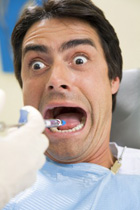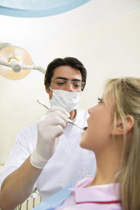 Even if we are flying around like ‘mad things’ in central Leeds, we all take time out to get the basic dental treatment we require to maintain a healthy mouth, right? But over time, the general look of our teeth can start to fade through staining, and sometimes, we just cannot find the time for extra curricular dental treatments such as whitening, which seems a shame, considering a bright smile can give us extra zest and confidence in what we do. Wouldn’t it be great if the tooth fairy could come and clean our teeth while we sleep? Well, he can! And his name is Enlighten tooth whitening! This new treatment promises to bring your teeth up to speed whatever their colour or age- while you sleep! All you have to do is get the dentist to take impressions of your mouth which are then sent of to a lab that will manufacture two liquid-tight trays. On their return, the treatment can begin. Just before bed, you fill the trays with the bleaching agent, pop them into the mouth and go to sleep. You do this for two weeks, making sure that you clean your teeth with whitening toothpaste and try to avoid staining foods and drinks and smoking. Once the two weeks are up, the dentist will carry out a quick deep bleaching session which ‘cures, the treatment. Even though permanent, you may need the odd top-up, depending on what you subject your mouth to. So, what price this unobtrusive little piece of nocturnal magic? Just leave around £500 under your pillow one night!
Even if we are flying around like ‘mad things’ in central Leeds, we all take time out to get the basic dental treatment we require to maintain a healthy mouth, right? But over time, the general look of our teeth can start to fade through staining, and sometimes, we just cannot find the time for extra curricular dental treatments such as whitening, which seems a shame, considering a bright smile can give us extra zest and confidence in what we do. Wouldn’t it be great if the tooth fairy could come and clean our teeth while we sleep? Well, he can! And his name is Enlighten tooth whitening! This new treatment promises to bring your teeth up to speed whatever their colour or age- while you sleep! All you have to do is get the dentist to take impressions of your mouth which are then sent of to a lab that will manufacture two liquid-tight trays. On their return, the treatment can begin. Just before bed, you fill the trays with the bleaching agent, pop them into the mouth and go to sleep. You do this for two weeks, making sure that you clean your teeth with whitening toothpaste and try to avoid staining foods and drinks and smoking. Once the two weeks are up, the dentist will carry out a quick deep bleaching session which ‘cures, the treatment. Even though permanent, you may need the odd top-up, depending on what you subject your mouth to. So, what price this unobtrusive little piece of nocturnal magic? Just leave around £500 under your pillow one night!





 Making an early diagnosis in any field of health care can be vital in administering the correct treatment early and the world of dentistry is no different. For a long time, x-rays have been invaluable in making a quick diagnosis in the mouth. They can reveal all manner of evils such as bone loss and decay, but also monitor older and ongoing treatments and symptoms like fillings, cosmetic work, crowns and teeth growth. Now however, x-rays have made an even greater leap forward- they have gone digital in the city of Leeds. Old methods of x-rays took film images that could take time to develop and were cumbersome to store. Digital has changed that, although the general principle of ‘getting a shot, hasn’t. It’s only once the image has been taken that digital really comes into its own. The image is fed into a computer and transferred onto a screen immediately. This can then be subjected to 3-D imaging and colour coding if required, and a precise diagnosis can be made on the spot. Of course, this then can be stored on the computer and even be used in conjunction with old x-rays. What this means for the patient is that treatment can begin straight away and nip any problems in the bud!
Making an early diagnosis in any field of health care can be vital in administering the correct treatment early and the world of dentistry is no different. For a long time, x-rays have been invaluable in making a quick diagnosis in the mouth. They can reveal all manner of evils such as bone loss and decay, but also monitor older and ongoing treatments and symptoms like fillings, cosmetic work, crowns and teeth growth. Now however, x-rays have made an even greater leap forward- they have gone digital in the city of Leeds. Old methods of x-rays took film images that could take time to develop and were cumbersome to store. Digital has changed that, although the general principle of ‘getting a shot, hasn’t. It’s only once the image has been taken that digital really comes into its own. The image is fed into a computer and transferred onto a screen immediately. This can then be subjected to 3-D imaging and colour coding if required, and a precise diagnosis can be made on the spot. Of course, this then can be stored on the computer and even be used in conjunction with old x-rays. What this means for the patient is that treatment can begin straight away and nip any problems in the bud! Against all our better efforts, there may come a time in Leeds when we have to face one of the biggest upheavals in our life- losing all our teeth. This can happen for a number of reasons, but the most common of all is gum disease. This can be a very traumatic time, putting years on you and suddenly making you feel as if you’ve got one foot in the grave.
Against all our better efforts, there may come a time in Leeds when we have to face one of the biggest upheavals in our life- losing all our teeth. This can happen for a number of reasons, but the most common of all is gum disease. This can be a very traumatic time, putting years on you and suddenly making you feel as if you’ve got one foot in the grave. If you suddenly find yourself acting strangely and irrationally at the thought of an up and coming visit to the dentists in the city of Leeds, chances are that you suffering from some form of dental phobia. Maybe you don’t know why you act this way, but something has caused this fear in your psyche and it needs to be addressed, for it can stop you having important dental treatment and make it difficult for your dentist to treat you too. Why we have such phobias can be complex and stem from a myriad of things. What happens to us during our childhood can cause these phobias; maybe we see dental treatment as a form of bullying, maybe the use of needles, scare us because of the pain we experienced when being inoculated at school. Previous dental visits may have been traumatic in the past, leaving us with fear of future visits. Whatever the reasons behind our phobias, they need to be confronted as it’s very important to maintain a healthy mouth. In extreme cases, counselling may be required to get to the root of the problem, but it may help to educate ourselves in the treatments we have- consult with our dentist on our fears, most dentists are trained in dental anxiety and can enlighten us in dental procedures, so that we can have a level of control over the treatments we choose and be aware of all the sedation techniques available and anaesthetics we can have to avoid pain, or the fear of it. Then and only then can we place our trust in our dentist and get the correct treatment we require.
If you suddenly find yourself acting strangely and irrationally at the thought of an up and coming visit to the dentists in the city of Leeds, chances are that you suffering from some form of dental phobia. Maybe you don’t know why you act this way, but something has caused this fear in your psyche and it needs to be addressed, for it can stop you having important dental treatment and make it difficult for your dentist to treat you too. Why we have such phobias can be complex and stem from a myriad of things. What happens to us during our childhood can cause these phobias; maybe we see dental treatment as a form of bullying, maybe the use of needles, scare us because of the pain we experienced when being inoculated at school. Previous dental visits may have been traumatic in the past, leaving us with fear of future visits. Whatever the reasons behind our phobias, they need to be confronted as it’s very important to maintain a healthy mouth. In extreme cases, counselling may be required to get to the root of the problem, but it may help to educate ourselves in the treatments we have- consult with our dentist on our fears, most dentists are trained in dental anxiety and can enlighten us in dental procedures, so that we can have a level of control over the treatments we choose and be aware of all the sedation techniques available and anaesthetics we can have to avoid pain, or the fear of it. Then and only then can we place our trust in our dentist and get the correct treatment we require. You never really know when you may be struck down with dental pain in central Leeds and it could be in an evening or weekend out of dental hours. It’s important to understand and identify the nature of the aggravation in situations like these, so that if needed, you can ease the problem yourself until treatment can be administered by your dentist. Such pains can arise from a chipped tooth, a filling falling out or a veneer dropping off that can leave a sharp edge in the mouth and expose the gums and tongue to lacerations. Other problems can stem from recent dental treatments such as root canals- these pains generally subside in time, but can be eased by using mild pain killers. Most pain however can stem from a period decay in the mouth and then strikes immediately in the form of a toothache. This is where the nerve is exposed and reacts to cold or hot temperatures or chewing. Again, mild pain killers can be used along with keeping the tooth clean until a dentist can be sought. An abscess, however can cause the face to swell and can poison the bloodstream, developing into an extremely dangerous situation and immediate treatment needs to be administered from a dentist or doctor. Information on such problems can be found at the dentists, or is available on the internet. But the more you understand these problems, the easier it is to self-treat them.
You never really know when you may be struck down with dental pain in central Leeds and it could be in an evening or weekend out of dental hours. It’s important to understand and identify the nature of the aggravation in situations like these, so that if needed, you can ease the problem yourself until treatment can be administered by your dentist. Such pains can arise from a chipped tooth, a filling falling out or a veneer dropping off that can leave a sharp edge in the mouth and expose the gums and tongue to lacerations. Other problems can stem from recent dental treatments such as root canals- these pains generally subside in time, but can be eased by using mild pain killers. Most pain however can stem from a period decay in the mouth and then strikes immediately in the form of a toothache. This is where the nerve is exposed and reacts to cold or hot temperatures or chewing. Again, mild pain killers can be used along with keeping the tooth clean until a dentist can be sought. An abscess, however can cause the face to swell and can poison the bloodstream, developing into an extremely dangerous situation and immediate treatment needs to be administered from a dentist or doctor. Information on such problems can be found at the dentists, or is available on the internet. But the more you understand these problems, the easier it is to self-treat them. Dentistry, like most areas of health care, has gone through a lot of transitions in the past 30 years and this can be directly linked to the introduction of the computer. It has opened up new areas of medical procedures and combined with digital imaging, pinpoint surgery and healing techniques, dentistry has moved effortlessly into the 21st century. This is ever more evident in the use of dental implants and though the theory behind fitting an implant hasn’t changed, the surgery techniques and healing have; it has become an exact science. An implant is used to replace missing teeth and is essentially a new titanium root, screwed into the bone, to which the new teeth are attached. At one time, the whole treatment could be very lengthy and success relied heavily on the healing process, which could take up to 6 months, because the gums would have to be cut and re-stitched. However, the use of digital imaging has allowed the implant to be placed precisely into position and keyhole surgery allows the titanium root to be insert through the gum, minimising the damage and then, the healing can be stimulated with plasma proteins. In the case of mini-implants, used with bridges and dentures, work is complete in a day! With such refinements in implant technology, comes refinement in price- a single implant can be as little as £300 and it’s falling all the time. And it’s not too far off in the future, when such advancements in implant treatments, will finally resign the tricky subject of dentures to the history books.
Dentistry, like most areas of health care, has gone through a lot of transitions in the past 30 years and this can be directly linked to the introduction of the computer. It has opened up new areas of medical procedures and combined with digital imaging, pinpoint surgery and healing techniques, dentistry has moved effortlessly into the 21st century. This is ever more evident in the use of dental implants and though the theory behind fitting an implant hasn’t changed, the surgery techniques and healing have; it has become an exact science. An implant is used to replace missing teeth and is essentially a new titanium root, screwed into the bone, to which the new teeth are attached. At one time, the whole treatment could be very lengthy and success relied heavily on the healing process, which could take up to 6 months, because the gums would have to be cut and re-stitched. However, the use of digital imaging has allowed the implant to be placed precisely into position and keyhole surgery allows the titanium root to be insert through the gum, minimising the damage and then, the healing can be stimulated with plasma proteins. In the case of mini-implants, used with bridges and dentures, work is complete in a day! With such refinements in implant technology, comes refinement in price- a single implant can be as little as £300 and it’s falling all the time. And it’s not too far off in the future, when such advancements in implant treatments, will finally resign the tricky subject of dentures to the history books. In the city of Leeds, dental decay, at some point, affects over 60% of adults and an alarming 80% of children. It’s normally caused by a lack of oral hygiene combined with the consumption of starchy and sugary foods and drinks. Smoking, drinking and bad diet can lead to a dry mouth. Together, these factors can lead to gum disease and bacteria building up very quickly in the mouth and if not removed, leads to plaque forming and breaking down the surface of the teeth. At worst, cavities or caries can form, resulting in tooth loss over time. Yet, dental decay is also very easy to avoid. It starts at home with good diet and oral health care. Brushing correctly with the right tooth brush and paste, combined with flossing and rinsing should be enough to keep decay at bay. However, some bacteria will break through, so it’s always important to keep up with regular visits to the dentist. It’s the best way of having plaque and tartar removed. Early signs of decay can be spotted with a simple x-ray and treated immediately and if the decay is advanced, the inside of the tooth can be cleared out with a root canal and then filled or capped. Tooth decay spreads fast and looks ugly in the mouth and can be expensive to rectify but with a good hygiene program, there’s no reason why it should be a problem.
In the city of Leeds, dental decay, at some point, affects over 60% of adults and an alarming 80% of children. It’s normally caused by a lack of oral hygiene combined with the consumption of starchy and sugary foods and drinks. Smoking, drinking and bad diet can lead to a dry mouth. Together, these factors can lead to gum disease and bacteria building up very quickly in the mouth and if not removed, leads to plaque forming and breaking down the surface of the teeth. At worst, cavities or caries can form, resulting in tooth loss over time. Yet, dental decay is also very easy to avoid. It starts at home with good diet and oral health care. Brushing correctly with the right tooth brush and paste, combined with flossing and rinsing should be enough to keep decay at bay. However, some bacteria will break through, so it’s always important to keep up with regular visits to the dentist. It’s the best way of having plaque and tartar removed. Early signs of decay can be spotted with a simple x-ray and treated immediately and if the decay is advanced, the inside of the tooth can be cleared out with a root canal and then filled or capped. Tooth decay spreads fast and looks ugly in the mouth and can be expensive to rectify but with a good hygiene program, there’s no reason why it should be a problem. In central Leeds, it very easy to put-off a visit to the dentist and instead, concentrate on much more pressing matters. In fact, going to the dentist can be seen as quite an inconvenient chore by some of us, opting instead to leave it until there’s a problem. But going to the dentist is not just about having treatment; sure enough, the dentist will clean your teeth, combat any signs disease and decay, remove plaque and advise you on how to avoid any problems in the future. But a visit should also be seen as a chance to discuss any issues that have concerned you since your last visit, such as oral hygiene (brushes, pastes and mouth washes), dietary habits or talk about possible cosmetic work. Doesn’t sound too drastic an idea now, does it, for ignore check-ups at your peril. Complications can spiral out of control very quickly in the mouth. Something as simple as poor hygiene, can lead to bacteria building up, developing into plaque, gum disease cavities and eventually tooth loss. If you wait for a problem to arise before you get it checked out, chances are, the problem has been building for some time, meaning that it may require complex and expensive treatment to rectify. And the implications of missing regular check-ups go even deeper. An unhealthy mouth can lead to an unhealthy head and body. Badly looked after teeth can lead to problems in the eyes, ears and neck, and can cause repertory, heart, blood and digestive problems….and to think the average check-up only takes 10 minutes!
In central Leeds, it very easy to put-off a visit to the dentist and instead, concentrate on much more pressing matters. In fact, going to the dentist can be seen as quite an inconvenient chore by some of us, opting instead to leave it until there’s a problem. But going to the dentist is not just about having treatment; sure enough, the dentist will clean your teeth, combat any signs disease and decay, remove plaque and advise you on how to avoid any problems in the future. But a visit should also be seen as a chance to discuss any issues that have concerned you since your last visit, such as oral hygiene (brushes, pastes and mouth washes), dietary habits or talk about possible cosmetic work. Doesn’t sound too drastic an idea now, does it, for ignore check-ups at your peril. Complications can spiral out of control very quickly in the mouth. Something as simple as poor hygiene, can lead to bacteria building up, developing into plaque, gum disease cavities and eventually tooth loss. If you wait for a problem to arise before you get it checked out, chances are, the problem has been building for some time, meaning that it may require complex and expensive treatment to rectify. And the implications of missing regular check-ups go even deeper. An unhealthy mouth can lead to an unhealthy head and body. Badly looked after teeth can lead to problems in the eyes, ears and neck, and can cause repertory, heart, blood and digestive problems….and to think the average check-up only takes 10 minutes! Getting a dental bridge in Leeds could be the answer to that missing tooth, especially if that gap is in the front of your mouth, which can look quite unsightly. Vanity aside though, it’s not the only reason you should consider a replacement- oral health comes into the equation too. The gap is a food trap and can lead to a build-up of bacteria. It can lead to further infection and disease and the teeth that are left are vulnerable to movement. A bridge is one treatment to solve these problems and one of the cheaper alternatives on the market. Depending on where the tooth has been lost, there are three out there to remedy the loss. The more popular choice is where one or two teeth that are attached to a crown at each end and then cemented onto the teeth that remain around the gap. If there are more than two teeth missing, the strength of the bridge can be enhanced by attaching it onto a mini implant. A cantilever bridge fixes the new tooth to one remaining tooth using wires and resin bonding, as does a Maryland bridge, bonding to two or more teeth. They can be manufactured in varying materials from porcelain to gold- this also depends on how much work is required from the bridge, such as chewing.
Getting a dental bridge in Leeds could be the answer to that missing tooth, especially if that gap is in the front of your mouth, which can look quite unsightly. Vanity aside though, it’s not the only reason you should consider a replacement- oral health comes into the equation too. The gap is a food trap and can lead to a build-up of bacteria. It can lead to further infection and disease and the teeth that are left are vulnerable to movement. A bridge is one treatment to solve these problems and one of the cheaper alternatives on the market. Depending on where the tooth has been lost, there are three out there to remedy the loss. The more popular choice is where one or two teeth that are attached to a crown at each end and then cemented onto the teeth that remain around the gap. If there are more than two teeth missing, the strength of the bridge can be enhanced by attaching it onto a mini implant. A cantilever bridge fixes the new tooth to one remaining tooth using wires and resin bonding, as does a Maryland bridge, bonding to two or more teeth. They can be manufactured in varying materials from porcelain to gold- this also depends on how much work is required from the bridge, such as chewing. If you suffer from dental anxiety in the city of Leeds, it can make very difficult to pluck up the courage to attend the dentist and get the dental treatment you require, opting to visit only in an emergency, which is very dangerous territory for the overall health of your mouth. It’s not any easier for the dentist either to treat a patient with anxiety, but whatever has caused these fears, for health reasons alone, it is important to confront them. Most dentists understand the fears in their patients and are trained in anxiety psychology. Talking to your dentist is paramount in overcoming your problems, being able to express yourself, taking control of your treatment and building up some sense of rapport with your dentist. Once you develop more confidence and a better understanding of dental procedures (even check out the internet), the easier the treatments become. Once you have opted to have the work done, there are many back-up supports to make your visit easier too. Most modern dentists incorporate relaxation, sedation and even hypnotherapy techniques to put you at ease and of course, there are the tried and tested methods. Anaesthetics are great for removing the physical pain, but if you have extreme anxiety, there is always the option of being knocked out altogether. Book your appointment early so you’re not hanging around to be seen. It’s time to get out there and fight your anxieties and keep your mouth healthy.
If you suffer from dental anxiety in the city of Leeds, it can make very difficult to pluck up the courage to attend the dentist and get the dental treatment you require, opting to visit only in an emergency, which is very dangerous territory for the overall health of your mouth. It’s not any easier for the dentist either to treat a patient with anxiety, but whatever has caused these fears, for health reasons alone, it is important to confront them. Most dentists understand the fears in their patients and are trained in anxiety psychology. Talking to your dentist is paramount in overcoming your problems, being able to express yourself, taking control of your treatment and building up some sense of rapport with your dentist. Once you develop more confidence and a better understanding of dental procedures (even check out the internet), the easier the treatments become. Once you have opted to have the work done, there are many back-up supports to make your visit easier too. Most modern dentists incorporate relaxation, sedation and even hypnotherapy techniques to put you at ease and of course, there are the tried and tested methods. Anaesthetics are great for removing the physical pain, but if you have extreme anxiety, there is always the option of being knocked out altogether. Book your appointment early so you’re not hanging around to be seen. It’s time to get out there and fight your anxieties and keep your mouth healthy.

